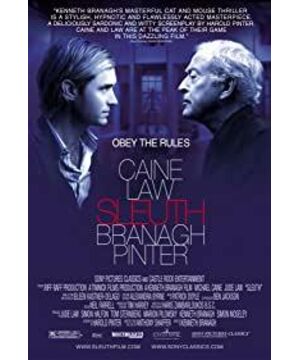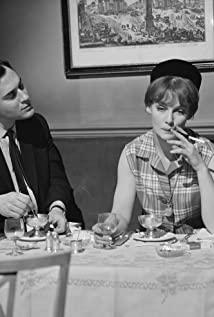The former was shot in 1972, the latter was shot in 2008, and the latter is a remake of the former. But it's not a complete remake.
The structure and main line of the two films are the same. From beginning to end, there are only two characters-Andrew, the famous writer whose wife was taken away, and Mellow, who came to talk to Andrew as his wife's lover. Mellow followed his father from Italy to London, England to make a living. He was a grassroots class through and through. With his own efforts, he began to emerge in the upper class and captured the hearts of the wife of a famous writer. He wanted to stay with his lover forever, so he came to Andrew's house to negotiate with him, hoping that he could sign the divorce agreement. But the cunning Andrew designed a trap. He tricked Melo into believing that he was actually tired of his wife and was extremely dissatisfied with her profligacy. So he thought of a "best of both worlds" method: Melo pretended to be The robber broke in and snatched the priceless jewels, so that Andrew could get insurance claims and be happy and happy for his lover, and Mellow could also stay with his wife. Mellow listened to him, and was tricked by him to instruct to break into the door, open the safe and get the jewellery. But at this time Andrew pointed his gun at Melo. He mocked Melo mercilessly and watched with enjoyment as Melo shivered under his gun, crying for mercy without dignity, and then Triggered the trigger. Melo fell to the ground.
The next night, Andrew ushered in the detective who was investigating Mellow's disappearance. In responding to the detective's investigation, he uttered a shocking statement: He did not shoot Melo, that shot was just an empty bullet, and the purpose was to humiliate him and make him break his self-righteous delusion. But the inspector insisted that Andrew really shot Melo, and found blood and blood in the room. Andrew was stunned by this unexpected scene, and he panicked to defend himself. He was violently tortured by the inspector, saving face. sweep the floor. At this time, the plot had a huge reversal here, and the inspector suddenly tore off his disguise. It turned out that he was pretending to be Melo. This action was to avenge his revenge.
The plots of the new and old movies are basically the same here, but the trends behind them are different. It is these differences that make these two "Footprints" in my eyes a series of inheritance and development. In the 1972 version of the movie, the next plot is that Mellow single-handedly concocted a "murder case", making Andrew exhausted to destroy the "evidence" that Mellow laid around in order to wash away his suspicion of murdering his lover. This time, Melo became a cat, and Andrew became a poor, teased mouse. He was played between the palms of Melo's hands. He had to desperately guess the depth of Melo’s language full of ridicule and sarcasm. Meaning, it is good to find evidence based on this. In the process, Andrew was embarrassed and suffered humiliation, while the grassroots class, the little character Mellow, finally took a deep breath, stepped on the upper class, and realized the long-cherished wish of his ancestors for generations. In the end, Andrew, who learned that the murder was a fake, couldn't bear his weakness and humble ugliness. But at this time, the warning lights were already flashing outside the door, and the button that Mellow pressed before his death caused all the dolls in the living room Andrew's painstaking collection to make a sharp noise, as if to announce that Andrew was equally unbearable.
The 1972 version of "Footprints" narrated this story, exposing the greed, selfishness, weakness and timidity in human nature, and secretly highlighting the suppression and contempt of the grassroots class by the upper class, as well as the anger and anger of the grassroots class. Revolt. It's a pretty good movie, but it won't give people too much reflection and aftertaste, nothing more.
But the 2008 version of "Footprints" has undergone a radical change. The director is no longer satisfied with the reflection of human nature, he wants to deconstruct the social form allegorically. Only from the interior furnishings of the house, we can get a glimpse of it. In the old version of the movie, Andrew's home furnishings are complicated, but only with his distinctive personal style, the purpose is to express his extreme narcissism. However, the layout of the new version has obvious meaning: it is a house full of inspiration and art, and the designer is the woman the two are fighting for: Maggie.
I think Maggie is a symbol of the muse in the movie. Andrew, a veteran writer, once owned her and achieved fame. But after entering his twilight years, although his wealth was huge, but his talents were exhausted, the muse left him and turned to favor the young, energetic and creative young actor Melo. Andrew seems to still be living in the palace of the Muse, but in fact he has long since lost her. He can only take a pity on himself and reminisce about the glory of the past.
At this time, the younger generation began to challenge the older generation with their genius and courage. Faced with the provocations of young people, the "superior" with high finances replied with sincere teaching: "In this world, it is not enough to have ideas and enthusiasm. We must first guarantee life. If even life is unsustainable, then What ideals to talk about? Come on, follow me, I can give you a good future." This trick seems to be warm and caring, but in fact it is a ruthless stifling of the younger generation. Don't you see, how many talented and ideal young people are persuaded by the phrase "get financial freedom first, and then realize their spiritual ideals" to spend their energy and time in the golden age on buying houses and getting public examinations for the so-called stability? But in the end, the vast majority of people can no longer find their original self. That empty bullet has destroyed the spiritual world of how many people!
A few survivors crawled out of the humiliating mud and began to take revenge with full of resentment. They slapped the "superior" with their own creativity, and let the "superior" see their own weakness and pitiful side. But they knew that this was not enough, and a deeper blow was needed to truly make a return. In the new version of the movie, Mellow drew his gun, beat and intimidated Andrew to give him the jewels. Andrew thought that Mai Luo was looking for money, but he secretly let go of his heartache. But unexpectedly, after getting the jewelry, Melo didn't claim it as his own, but decorated them on Andrew's body. Seeing the "superior" surrounding his only Ah Duwu, showing a funny and pitiful ugliness, the young man laughed at him heartily and laughed at money: from the previous humiliation, he finally understood that he would never Dignity and freedom should be sacrificed for money. And in the eyes of the young man watching a joke, the "superior" also saw his pitiful appearance now, his tall image was already shaky.
But all this is not over, Andrew calmed down and made a shocking suggestion again: "I admire you, let Maggie go aside! Let's live together. I will use my power to make you truly among the ranks. In the upper class, go to the place you dream of, and get to know someone with high authority that you may not meet in your life, such as the Queen of England." The "superior" used another trump card of his own-power and motivated young people. Another deep sensitive nerve. The worship of power has never been greater than the desire for money. If money can make people like a king, then power can make people a god. Possessing power can give a person the illusion of "I am omnipotent".
Melo hesitated, he was tempted, and Andrew went a step further and told him sincerely: "I admire your thoughts." Melo's tears filled his eyelashes: "They usually admire my body, but they don't care about mine at all. Thought." Yes, the real world is cruel, and we may lose a lot in the initial stage on the road to success. Maybe we have to kitsch, succumbing to the direct or even naked tastes and desires of the public. Andrew knows this well, and he must have tasted this kind of bitterness before, so he can accurately grasp Mellow's weakness.
At this moment, Mellow's cell phone rang and Maggie called. She told him that she loved him. The muse in his heart felt a huge crisis, and she tried hard to re-firm his shaken heart and let him refuse the temptation of power. But after putting down the phone, Melo continued to weave a "better future" with Andrew, and began to ask Andrew to pour wine for him, in order to verify Andrew's sincerity and sincerity to him-the
moment Melo accepted Andrew's terms, it was a success. For Andrew's vassal, his value can only be demonstrated by the attitude of the "superior" towards him: if you pet you, you are a character; if you don't pet you, you are nothing.
When he drank the wine that Andrew had poured, he received a call from Maggie again: She doesn't love him anymore, she wants to return to Andrew's side.
The Muse abandoned him.
The young man who has lost the Muses once again sees reality clearly, and following the "superior" will only become his plaything. He broke free from the gentle trap of desire, and regained his independent mind. He put on the clothes of the Muse, ready to move on with her company, walking his own way, but was stopped by the "superior". As soon as he turned his head, gunfire sounded.
This time it is true. Although the "superior" was completely denied and despised by the young people, he could still use the enormous earthly power in his hands to destroy him and destroy this real threat. The face of the "superior" was calm and waveless, and outside the door, the Muse was about to rush to the sky, but was already powerless.
Such murders are invisibly staged around us every day.
Finally, it is worth mentioning that after 35 years of "Footprints", there is a common actor in them, that is, Michael Kane. He played the young man Mellow in the old version, but in the new version he became the "superior" Andrew he had tried his best to resist. Thirty-five years have been enough to erase the vitality and hope in the eyes of young people, and replace them with gloom and despair. He was also young and had endless dreams, but now he has become the best he used to be. People who hate.
Take this as a lesson and encourage yourself.
Text / Cao Huaining 2016.10.27
View more about Sleuth reviews










